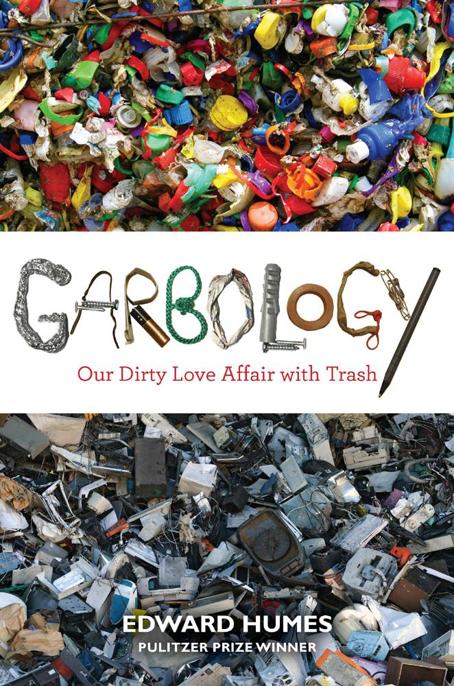
Garbology
Our Dirty Love Affair with Trash
کتاب های مرتبط
- اطلاعات
- نقد و بررسی
- دیدگاه کاربران
نقد و بررسی

April 9, 2012
On average, every American will generate 102 tons of trash in their lifetime. Pulitzer Prize-winner Humes (No Matter How Loud I Shout: A Year in the Life of Juvenile Court) asks how that number came to be, and what can be done to reduce it. To answer those questions, he interviews an interesting cast of characters, including Mike Speiser, the operator of the massive trash compactor at the Puente Hills landfill in Los Angeles, home to a 130 million-ton pile of waste; archeologist Bill Rathje, "the world's first garbologist," who asserts that "people don't really know their trashâ¦But through their trash, we sure do know a lot about them;" and Andy Keller, a vocal and provocative advocate for reusable shopping bags. Humes provides a history of waste management in America, from the use of piggeries in the 19th century (where garbage was fed to pigs) to today's reliance on landfills, and he examines the cycles of consumerism and the advent of plastics as obvious causes of the current trash crisis, pointing to a San Francisco family who lives a "near-zero waste lifestyle" as an example of possible alternatives. In his epilogue, Humes offers excellent tips for being more resourceful, so that our lives might not be "monuments to waste." Humes' take on the science and culture of "garbology" is both academic and deeply personal, making this a fascinating read.

March 1, 2012
Pulitzer Prize-winning journalist Humes (Force of Nature: The Unlikely Story of Wal-Mart's Green Revolution, 2011, etc.) examines how wastefulness is built into the American way of life. The author shines a spotlight on every aspect of the economy, from corporate practices to the habits of individual families, to substantiate his thesis that "the American Dream is inextricably linked to an endless, accelerating accumulation of trash." Marketing encourages wastefulness, he writes; planned obsolescence is built in to manufactured products, and purchasing the new rather than repairing the old has become the order of the day. The products "all come packaged in instant trash [and] what's inside that packaging is destined to break, become obsolete, get used up or become unfashionable in a few years, months or even days." Humes offers plenty of surprising, even shocking, statistics--e.g., one in every six big trucks in America is a garbage truck; according to the EPA, from 1980 to 2000, "the average American daily trash load increased by a third." This is more than 50 percent higher than in other countries with a similar standard of living. Humes discusses the problem of pollution caused by the proliferation of trash, specifically hazardous, nonbiodegradable waste. He uses the example of Coca-Cola's mid-1960s substitution of plastic for reusable glass bottles to show how companies have cheapened their cost of production at the expense of the environment. The author also writes about families who have enthusiastically adopted more frugal lifestyles to protect the environment, taking simple measures such as downsizing their living accommodations, buying in bulk and not wasting food. He looks at the case of Ireland, where the government has introduced a tax on plastic bags; a similar proposal in San Francisco was blocked. An important addition to the environmentalist bookshelf.
COPYRIGHT(2012) Kirkus Reviews, ALL RIGHTS RESERVED.

Starred review from March 15, 2012
We the people of America are living in an official state of garbage denial, Humes, a Pulitzer Prizewinning journalist and author (Eco Barons, 2009), informs us, for we seem totally unaware that each of us, over the course of a lifetime, will generate 102 tons of trash. Zestful in his curiosity and irrepressible in his vivid chronicling, Humes takes us on a garbage tour, beginning with a hoarders' home, where an elderly couple were trapped and nearly killed by accumulated trash, and moving on to Puentes Hills, where a monumental Southern California landfill has become a garbage mountain. As Humes describes the complex and constant operations there, he swings into a fascinating history of trash, from ancient Athens and the first municipal dump to the legendary filth of nineteenth-century New York City to the crux of today's challenges, the plasticization of America. The plague of plastic bags and bottles and mindless, credit-card-fueled consumerism has many dire consequences, the worst of which is the trashing of the oceans, which have become poisonous plastic chowder. Then there arethe toxic politics and big business of garbage. But Humes finds hope in the innovative work of dedicated garbologists, trash trackers, and activists who are intent on exposing the hazards and travesties of excessive trash and pointing the way to the low-waste path. (Reprinted with permission of Booklist, copyright 2012, American Library Association.)

























دیدگاه کاربران